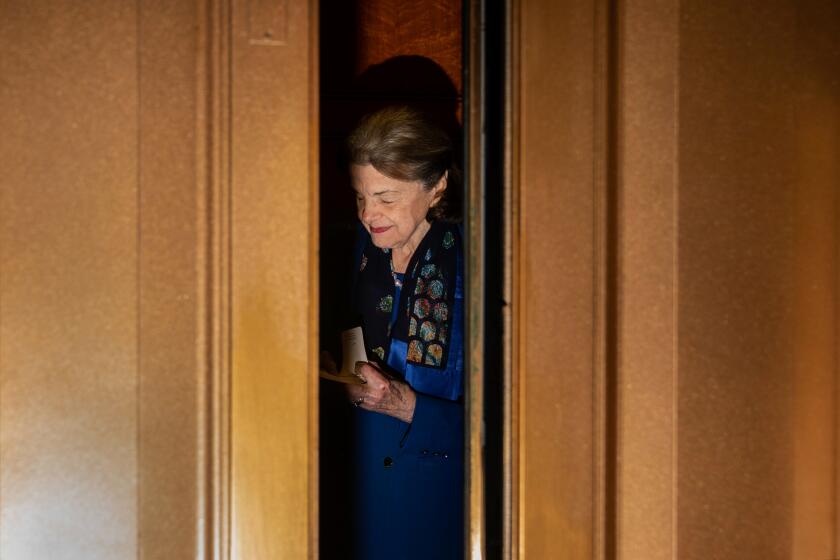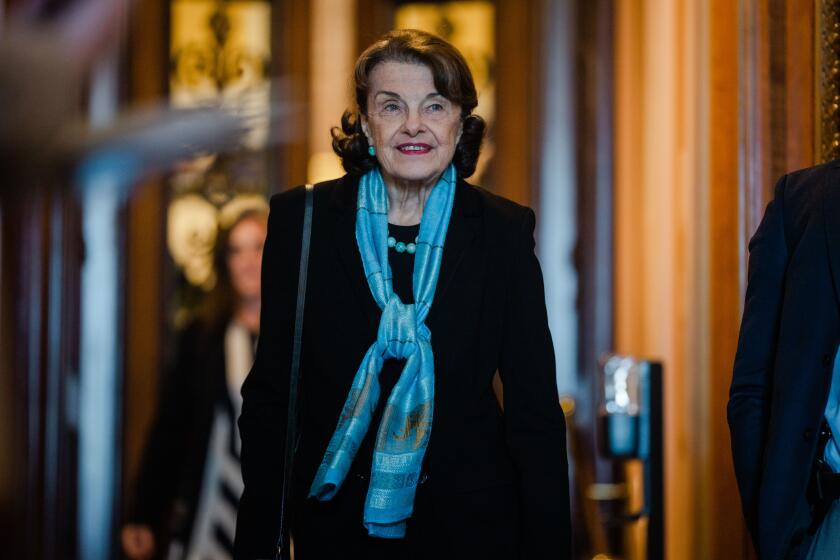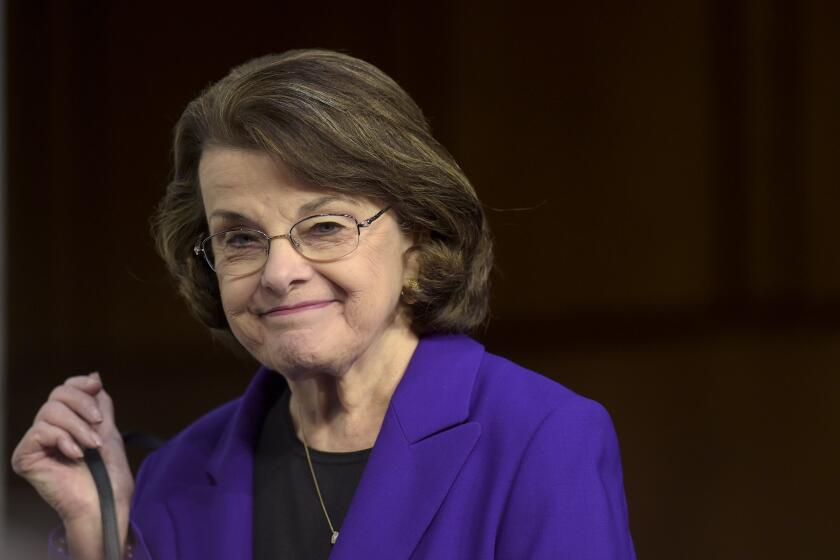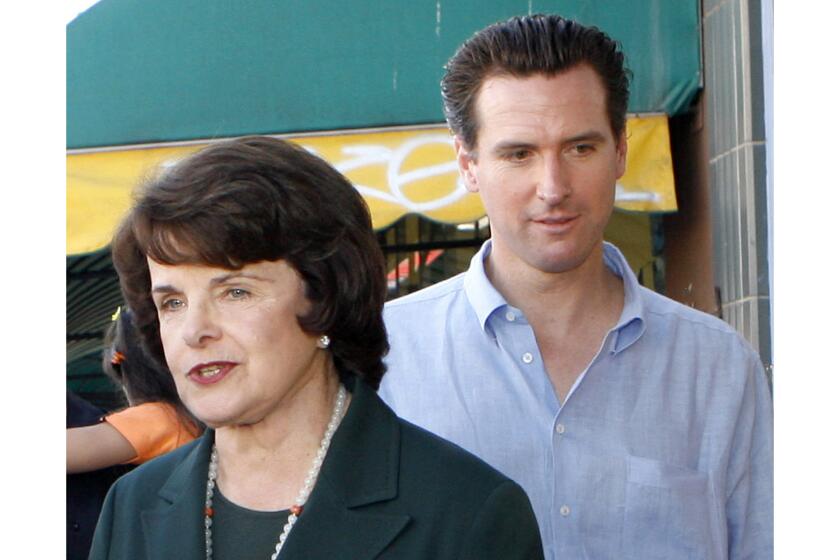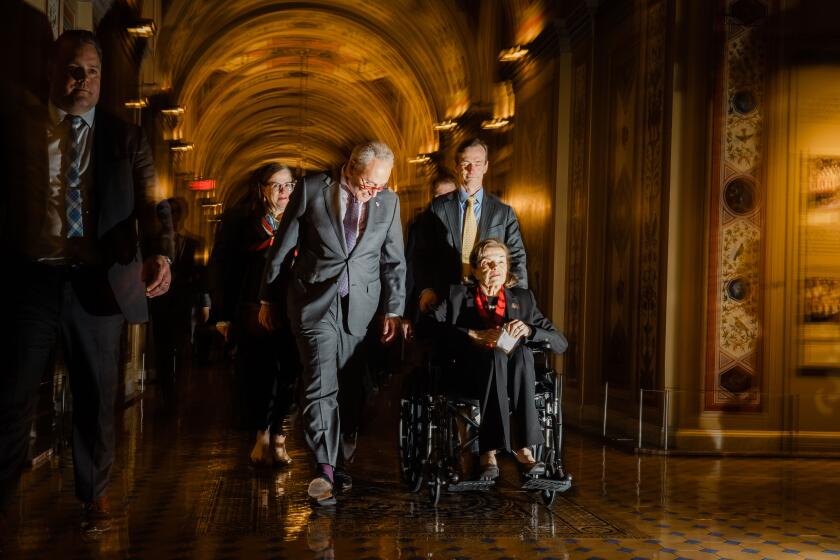Don’t let Dianne Feinstein’s conventional demeanor and centrist politics obscure her not-so-moderate legacy
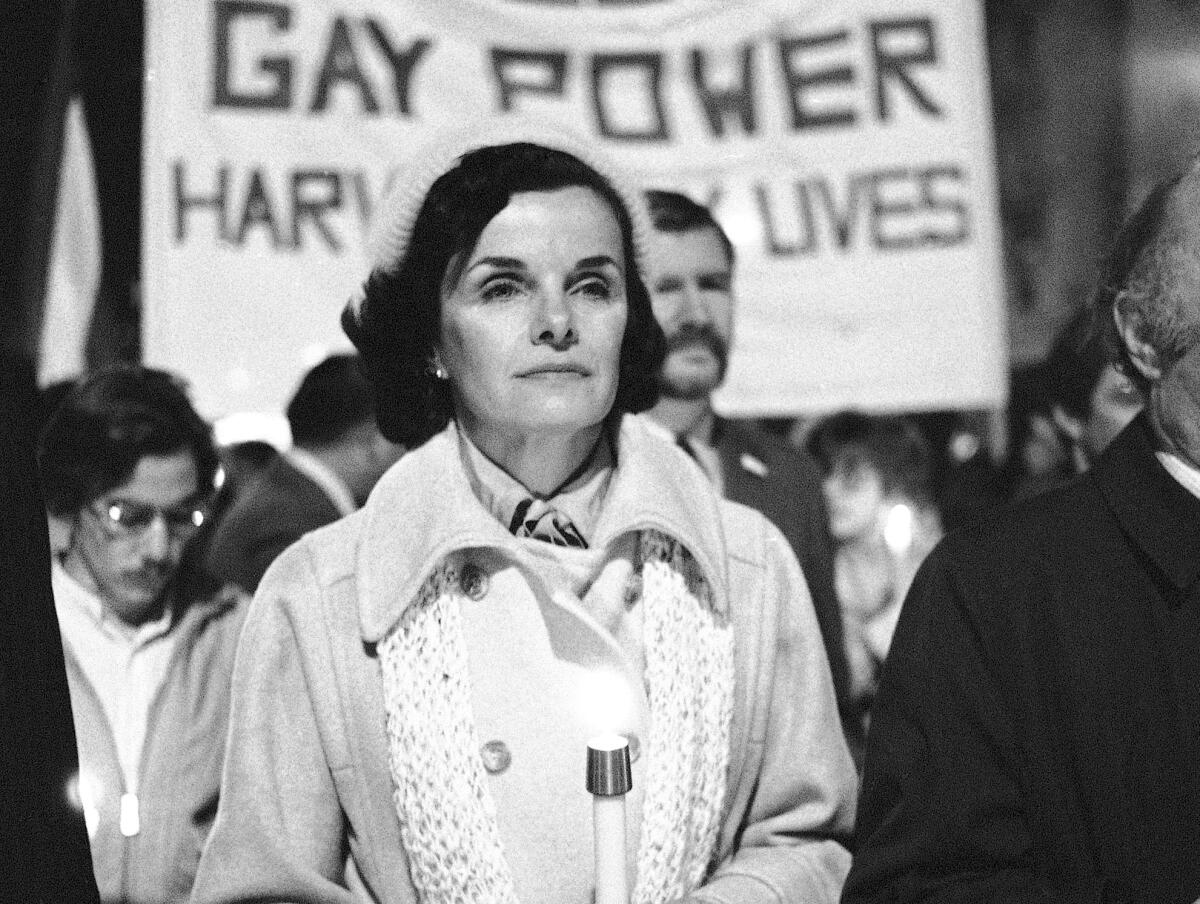
- Share via
Dianne Feinstein, San Francisco supervisor, mayor and United States senator from California over more than four decades, will be remembered as a political giant whose calm at a moment of civic turmoil soothed a broken city, and who waged fearless battles against guns and torture. She was, quite simply, an extraordinary American woman.
And yet, when I heard the news that she had died, I surprised myself by quietly exclaiming, “What a relief!”
It was awful to watch Feinstein’s all-too-public decline in recent years, her refusal to step down despite her obviously diminishing cognition and health, and to read about her family’s internecine battles over her late husband’s estate. What a terrible note to end on.
But a graceless end should not obscure DiFi’s shining accomplishments and her place in American history.
Here’s one reason Sen. Feinstein’s absence is drawing unusual attention: She is missed, badly. Democrats hold just a 51-49 Senate majority, so every vote is crucial.
I first became aware of Feinstein, as many in my generation did, in November 1978, after San Francisco Supervisor Harvey Milk and Mayor George Moscone were killed at City Hall by their former colleague, Supervisor Dan White.
I’d just graduated from college and was still living in Berkeley.
For years afterward, I thought that I had dreamed that the terrible news had broken on the same day that I had seen the Talking Heads play “Psycho Killer” at a free concert in Sproul Plaza. But no, it wasn’t a dream. The Talking Heads had in fact appeared on the UC Berkeley campus the day of the assassinations. That always seemed an ironic coincidence worthy of Joan Didion, another great California woman and contemporary of Feinstein.
At trial, White’s attorneys introduced the now infamous Twinkie defense, putting a psychiatrist on the stand to testify that White’s high consumption of sugary foods led to his diminished capacity. Bizarrely, the gambit worked, as White was convicted of voluntary manslaughter and served less than five years. He later died by suicide.
Sen. Feinstein comes by her extraordinary political legacy not because of any single legislative achievement but because she was recognizably solid, powerful and strong.
Through it all, Feinstein was a pillar of strength and resolve for her shaken city.
As her political ambition soared, Feinstein persisted through losses both personal and professional, and finally took her Senate seat in the momentous “Year of the Woman.”
After an all-male, all-white Senate Judiciary Committee bungled its 1991 hearings for then-Supreme Court nominee Clarence Thomas, who won confirmation despite credible accusations of sexual harassment by law professor Anita Hill, women were moved to run for office in unprecedented numbers.
Sen. Dianne Feinstein survived an assassination attempt and a mayoral recall to become the most popular politician in California for years running.
The following year, 24 women were elected to the House and a whopping four, including DiFi — an affectionate nickname bestowed by the political press — and Barbara Boxer, were elected to the Senate. California distinguished itself as the first state in American history to have two female senators simultaneously.
Feinstein was always considered a moderate Democrat; one of her Democratic opponents even called her a “secret Republican” when she sought her party’s nomination to the Senate in 1992. She certainly had a steady personal style; she never changed her bouffant hairstyle with its little flip, and to my eye always looked like a glamorous version of a 1950s housewife.
As moderate as her demeanor or politics could be, she made a profound mark embracing not-so-moderate causes, especially the ban on assault weapons.
The governor faces the politically challenging task of appointing someone to fill Dianne Feinstein’s Senate seat, and a chance to shape California representation.
Her baptism by gun violence in 1978 had turned her into a fierce advocate for the ban, contained in an amendment to the 1994 crime bill. Sadly, that ban expired 10 years later, and we are living with the terrible consequences of that today.
Lest you doubt the success of the ban, a 2019 study by a group of injury epidemiologists and trauma surgeons found that the number of mass shootings fell during its lifetime. They noted an “immediate and steep” rise in mass shootings starting in 2004, the year it expired.
It is no exaggeration to say that Feinstein’s dedication to reducing gun violence in this country has saved many, many lives.
For sheer courage, though, Feinstein will always be remembered for releasing in 2014 a 525-page excerpt of the Senate Intelligence Committee’s damning report on the CIA’s use of torture during interrogations of suspected terrorists in the years following the attacks of 9/11.
Barabak: Feinstein’s stubbornness kept her in office too long. But it also defined her success
It was selfish for Sen. Dianne Feinstein to stay in office. The other side to that stubbornness: ramrod determination and an unsinking resilience.
As chair of the committee, she bucked intense pressure to keep the findings secret.
Feinstein thought it was critically important for the public to know that, contrary to American ideals and values, the CIA tortured suspected terrorists with stress positions, rectal feedings, waterboardings and sleep deprivation. People died and lost the use of limbs. They were driven to hallucinations; they lost their minds. The CIA whisked prisoners to “black sites” in places like Thailand and Poland, where they were tortured with impunity.
Can you think of anything more disgusting than reviving a prisoner in order to keep torturing him?
The episode, Feinstein said, was “a stain on our values and history.”
The most damning conclusion of the report was that “enhanced interrogation,” as the CIA euphemistically called its torture policy, produced absolutely no intelligence of value.
“History will judge us,” Feinstein said, “by our commitment to a just society governed by law and the willingness to face an ugly truth, and say, ‘Never again.’ ”
In some ways, that was every bit as defining a moment for her as her response to the crisis in San Francisco nearly four decades earlier.
Dianne Feinstein’s steep decline and refusal to leave office will be forgotten, but her steady hand and righteous fights will not. What a career. What a life. What an inspiration.
More to Read
A cure for the common opinion
Get thought-provoking perspectives with our weekly newsletter.
You may occasionally receive promotional content from the Los Angeles Times.

